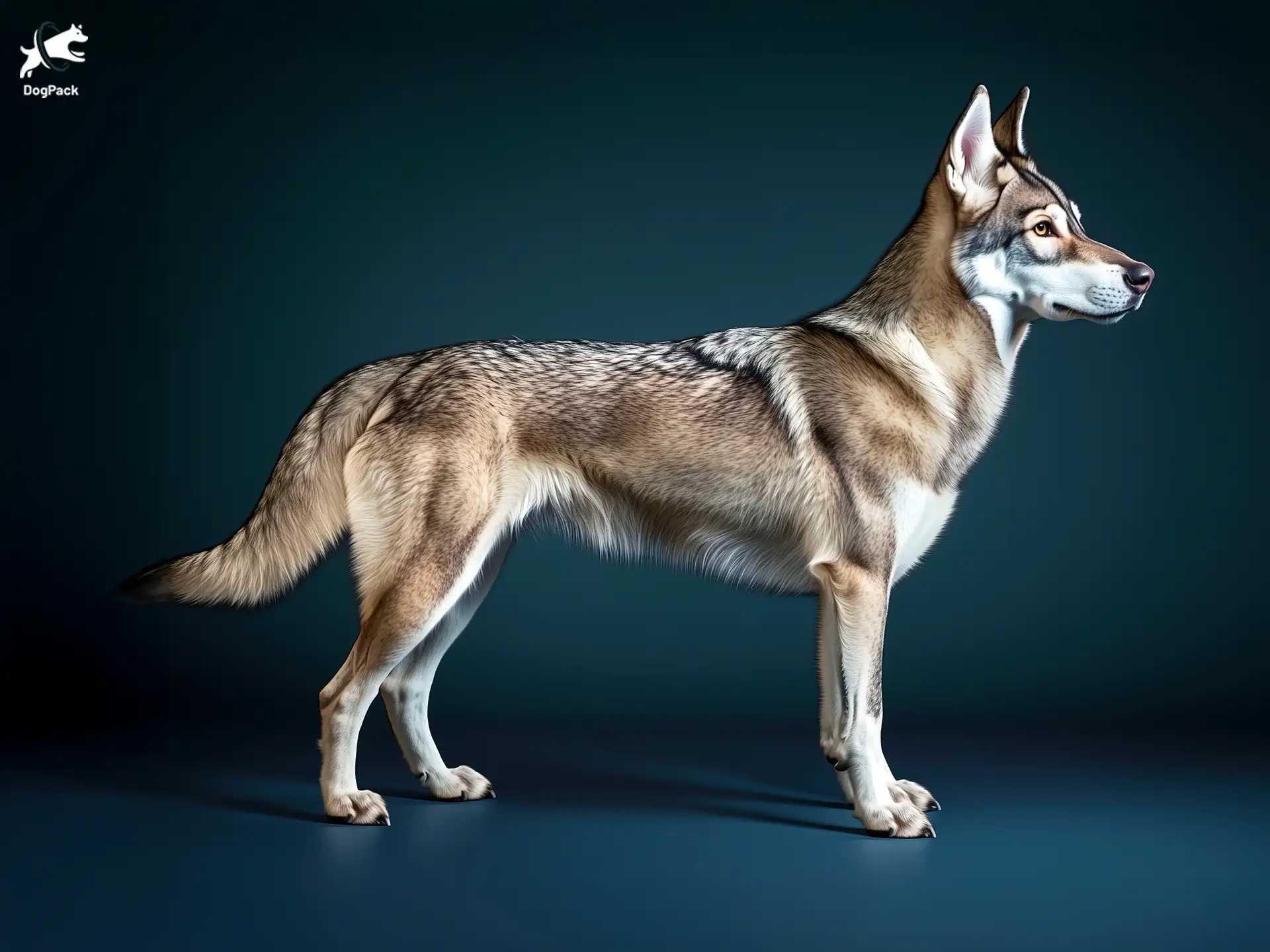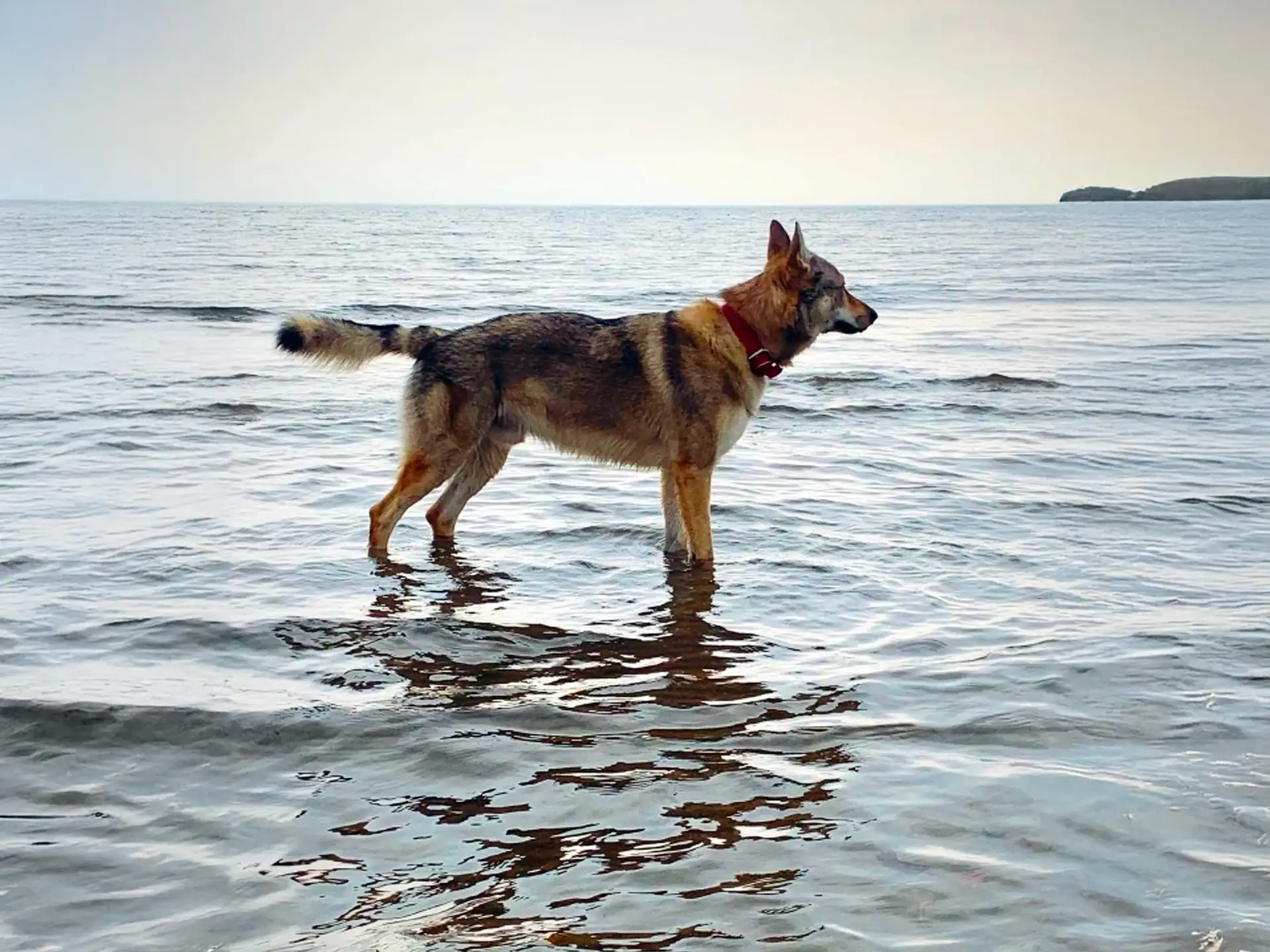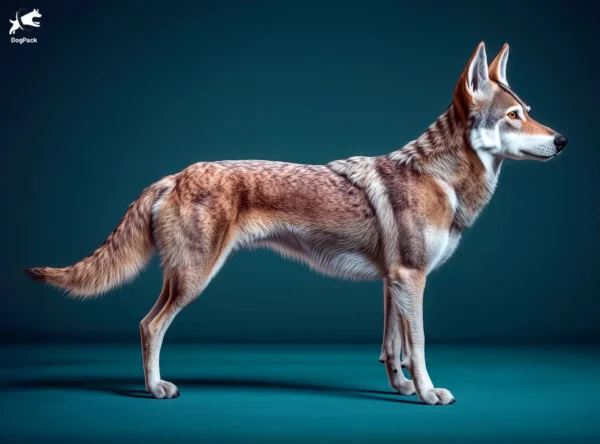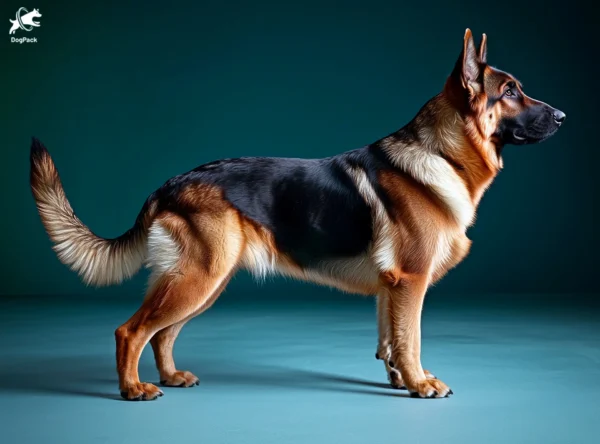Czechoslovakian Wolfdog Breed Info & Overview
The Czechoslovakian Wolfdog, a remarkable blend of German Shepherd intelligence and Carpathian wolf endurance, is a breed that exudes agility, loyalty, and a striking wolf-like appearance. Developed for demanding work, these dogs are known for their resilience and keen instincts. Despite their wild looks, Czechoslovakian Wolfdogs are deeply devoted to their human pack, combining strength and heart in a truly unique companion.
Characteristics
Pictures
Breed History
The Czechoslovakian Wolfdog’s origin story is as daring as the breed itself. Born from a 1950s military experiment in former Czechoslovakia, breeders crossed German Shepherds with Carpathian wolves to create the ultimate working dog. The goal? A loyal companion with the strength and resilience of a wolf, paired with the trainability of a dog—ideal for demanding military tasks.
In 1982, after refining the breed’s characteristics, the Czechoslovakian Wolfdog gained official recognition in its homeland. It didn’t take long for the breed’s reputation to spread, drawing attention from adventurous dog lovers. While they remain rare outside of Europe, their fierce loyalty and unique capabilities have sparked global interest among enthusiasts.
Today, these dogs take on various roles, from search and rescue to companionship. Their history reflects a blend of human ingenuity and a respect for nature, resulting in a breed that balances domesticated loyalty with wild endurance. A Czechoslovakian Wolfdog is more than just a pet; they’re a living piece of canine history.
Temperament, Personality
Intelligent, independent, and fiercely loyal, the Czechoslovakian Wolfdog is not your typical lapdog. These dogs form deep bonds with their human “pack” and thrive in an environment with a strong, confident leader. If you’re someone who appreciates a companion with both brains and loyalty, this breed will not disappoint.
Their wolf ancestry gives them a naturally curious and sometimes cautious personality. Early socialization is essential to help them feel comfortable with strangers and other pets. They’re protective by nature, making them excellent watchdogs, but they may need gentle guidance to temper their wariness around unfamiliar people.
Energetic and eager to work, Czechoslovakian Wolfdogs are happiest when mentally and physically engaged. They need activities that challenge their intellect and stamina, so be prepared for an enthusiastic and spirited friend who’s always ready for the next adventure!
Physical Characteristics
With their sleek, muscular build and penetrating amber eyes, the Czechoslovakian Wolfdog looks every bit like a creature from the wild. Their physique reflects their lineage: they are built for strength and endurance, with a lean frame and powerful legs that allow them to cover rough terrain with ease.
Their coat is dense and weather-resistant, ideal for withstanding the elements. Colors range from yellow-gray to silver-gray, with a signature light mask that accentuates their wolfish appearance. Erect, triangular ears and a keen, alert expression make them stand out wherever they go.
These dogs have a gait that’s graceful yet purposeful, moving with a fluidity that speaks to their wolf ancestry. While their appearance can seem intense, they carry themselves with a quiet confidence that reflects their calm and collected temperament.
Health Issues
The Czechoslovakian Wolfdog generally enjoys good health, thanks to its hardy genes. However, like any breed, they have a few genetic predispositions that owners should be aware of. Hip dysplasia is one of the more common issues, so regular screening and maintaining a healthy weight are essential for their joint health.
Another potential concern is elbow dysplasia, which can impact their mobility over time. Responsible breeders screen for these conditions to ensure they’re producing healthy puppies. Some Czechoslovakian Wolfdogs may also be at risk for degenerative myelopathy, a neurological condition that affects the spinal cord in older dogs.
Regular vet check-ups, a balanced diet, and sufficient exercise all contribute to a long and healthy life. Paying attention to their health early on will help prevent issues and keep your Czechoslovakian Wolfdog in top shape.
Grooming Needs
Despite their rugged appearance, the Czechoslovakian Wolfdog is surprisingly low-maintenance when it comes to grooming. Their dense double coat sheds lightly year-round, with seasonal shedding twice a year. A weekly brushing is usually enough to keep their coat in good condition, with extra attention during shedding periods.
They rarely need a bath, as their coat repels dirt and water naturally. Over-bathing can strip their coat’s natural oils, so only bathe them if absolutely necessary. Regular ear checks and nail trims are a must to avoid infections and keep them comfortable.
Grooming should be a positive experience; start from a young age to help them become comfortable with handling. A well-groomed Czechoslovakian Wolfdog not only looks sharp but feels good, too, and they’ll appreciate the attention!
Exercise Requirements
The Czechoslovakian Wolfdog isn’t just a pet; they’re an exercise partner in a fur coat. These high-energy dogs need a minimum of 1–2 hours of vigorous activity daily. They love long hikes, jogs, and anything that challenges their endurance. If you’re a hiker or runner, they’ll gladly join you every step of the way.
Along with physical exercise, they crave mental stimulation. Puzzle toys, training sessions, and even scent games help keep their sharp minds occupied. Without adequate exercise and engagement, they may become bored and develop unwanted behaviors.
These dogs excel in sports like obedience trials, agility, and tracking. An active lifestyle is essential to keeping them happy and well-behaved, so be ready for a loyal companion that’s always up for an adventure.
Training Tips
Training a Czechoslovakian Wolfdog requires patience, consistency, and respect for their independent spirit. They are intelligent and quick to learn, but they also have a strong will that calls for a confident handler. Positive reinforcement works wonders with this breed, as they respond best to praise and rewards.
Early socialization is crucial. Exposure to different environments, people, and other animals helps them grow into well-rounded adults. They’re naturally protective, so structured socialization helps them learn when to be cautious and when to relax.
Keeping training sessions varied and interesting is key. Boredom is the enemy for these sharp-minded dogs, so incorporate play, praise, and challenges into each session. Establish yourself as a calm, assertive leader, and they’ll respect you and be eager to follow your guidance.
Nutrition, Diet
A Czechoslovakian Wolfdog’s diet should be as energetic as they are! High-quality dog food, rich in proteins like beef, chicken, or fish, supports their muscular frame and active lifestyle. For these working dogs, a diet high in animal-based proteins fuels their physical and mental endurance, helping them thrive. Aim for about 2.5 to 3.5 cups daily, split between two meals to keep energy levels consistent.
Portion control is crucial, as they’re prone to weight gain if they don’t get enough exercise. Many owners find that adding raw foods or a BARF (Biologically Appropriate Raw Food) diet brings out their best; however, this requires careful planning to ensure balanced nutrition. Consulting a vet before diving into raw feeding is essential for safety and optimal health.
Always keep fresh water available, especially after exercise, to stay hydrated. A Czechoslovakian Wolfdog with the right fuel can keep up with even the most adventurous lifestyle. Tailoring their diet to their needs makes all the difference in their overall vitality and well-being.
Adoption, Breeders
Finding a Czechoslovakian Wolfdog is no small task, but it’s well worth the effort if you’re up for the challenge. Start by contacting the Czechoslovakian Vlcak Club of America, which offers resources for locating reputable breeders who prioritize health and temperament. Ethical breeders will be transparent, offering health clearances and allowing you to meet the puppy’s parents.
Adoption is also an option, though Czechoslovakian Wolfdogs are rare in shelters. Occasionally, organizations like Wolfdog Rescue Resources help rehome these dogs. Check with breed-specific rescues or keep an eye on adoption networks for rare opportunities to bring one into your home.
When choosing a breeder, ask detailed questions about the puppy’s lineage, socialization, and any health concerns. The more thorough your research, the more likely you are to find a healthy and well-tempered Czechoslovakian Wolfdog that fits perfectly into your life.
Family Pet?
The Czechoslovakian Wolfdog can be a fantastic family member for those who understand their unique needs. With strong loyalty instincts, they bond deeply with their human “pack” and love to be actively involved in family activities. These dogs need structure, so a home with established routines and confident leadership is ideal for them.
While they’re generally gentle with family members, their high energy and assertive personality mean they’re better suited to families with older children who can respect their boundaries. Supervised interactions with small pets are also recommended, as their wolf heritage can lead to a strong prey drive.
In a family setting, the Czechoslovakian Wolfdog thrives when they’re given plenty of physical and mental stimulation. With consistent training and attention, they can become a devoted and loving addition to active households that value their unique nature.
Right For You?
Are you the right fit for a Czechoslovakian Wolfdog? If you’re an outdoor enthusiast with experience handling independent, high-energy breeds, the answer may be yes. They thrive with owners who can provide ample space and activity, and they need someone who can dedicate time to training and bonding. These dogs love a good challenge and need a purpose.
Living in an apartment is generally not ideal, as they’re happiest with room to roam and explore. Without the right outlet for their energy, they can easily become bored and frustrated, so they suit active, spacious households. Their need for a confident handler also means they’re best for someone familiar with pack instincts and training techniques.
If you’re ready to meet their needs with commitment and enthusiasm, a Czechoslovakian Wolfdog will reward you with an unmatched bond and a unique, adventure-loving companion. This breed is best suited to those who see pet ownership as a lifestyle, not a hobby.
Conclusion
The Czechoslovakian Wolfdog is not your average canine companion. With their wolf-like appearance and spirited personality, they offer a unique experience for the right owner. If you’re up for the adventure and ready to embrace their needs, you’ll find a loyal and fascinating friend in this breed.
Their blend of intelligence, loyalty, and energy makes them stand out in the canine world. Are you prepared to join the pack?
FAQs
-
How closely related is the Czechoslovakian Wolfdog to actual wolves?
The Czechoslovakian Wolfdog was originally bred from German Shepherds and Carpathian wolves, resulting in a breed with wolf-like traits. However, after generations of selective breeding, it’s more domesticated than wild, yet still retains wolf-like instincts.
-
What kind of environment suits a Czechoslovakian Wolfdog best?
These dogs thrive in spacious, active environments where they can exercise their natural energy and endurance. Homes with access to large yards or close to open trails are ideal, as they’re happiest when exploring or engaging in physical activities.
-
Do Czechoslovakian Wolfdogs require special training techniques?
Yes, their intelligence and independence call for experienced, consistent training, ideally using positive reinforcement. Training focused on mental challenges and physical activities helps keep them engaged and prevents boredom-related behaviors.
-
How does the Czechoslovakian Wolfdog interact with children?
With proper socialization, Czechoslovakian Wolfdogs can be good family dogs, but their high energy levels and strength mean they’re better suited for families with older children who understand dog behavior and respect boundaries.
-
How much daily exercise does a Czechoslovakian Wolfdog need?
This breed needs a minimum of 1–2 hours of rigorous exercise daily, including activities like hiking, running, or agility games. Without enough activity, they may develop behavioral issues due to their need for physical and mental stimulation.
Breed Ratings
The Czechoslovakian Wolfdog is highly intelligent and quick to learn, making training both a challenge and a joy.
They are playful and enjoy interactive games, especially those that stimulate their mind and body.
With boundless energy, they require significant daily exercise to stay content and well-behaved.
Moderate shedding occurs year-round, with heavier shedding during seasonal changes.
A strong prey drive means caution is needed around smaller animals unless properly socialized.
Their coat requires minimal grooming, making upkeep relatively straightforward.
While intelligent, their independent nature can make training a bit challenging for inexperienced owners.
They prefer company and may develop separation anxiety if left alone for long periods.
Moderate vocalization; they may howl or bark to communicate but are not excessively noisy.
Low drooling makes them a cleaner choice for indoor living.
Can get along with other dogs if socialized early but may be dominant.
Generally healthy with few breed-specific issues when sourced from responsible breeders.














